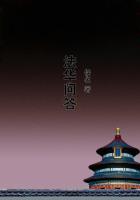would allow to share in the trade, - whether it would wink at smuggling, and, if so, to what extent and by whom; whether France could circumvent England, or England France, in Spain and the West Indies. The war, also, of England with Spain from 1739 to 1748, - which, in 1744, turned itself into a war with Spain and France, - had, in the main, no other object than this, to obtain a free course for the English smuggling trade with Spanish America; it was generally nicknamed by public opinion "the Smuggler's War."The Seven Years' War had its origin, as everyone knows, in the colonial rivalry of England and France in North America.
Whether the Ohio and Mississippi should furnish the Romance race or the Teutonic with a field for colonisation and trade, whether maritime and commercial supremacy for the next hundred or two hundred years should belong to England or France, - that was the far-reaching economic quarrel into which the great king of Prussia was drawn because he would not suffer his old ally France to attack his old enemy England in Hanover, i.e. in Germany. In defending Germany's neutrality in this commercial and colonial war, he was drawn into it himself; and when his brave troops defeated the French at Rossbach (1757) and elsewhere, they decided at the same time the great questions of the world's trade and of future colonial development. Without the victories of the Prussian grenadiers and the English fleet, England would not today have its world-wide trade, and the United States of America would not exist. It is probable that French would now be spoken alike on the Ohio and the Mississippi, at Calcutta and Bombay.
English commercial greatness and supremacy date from the successes of the war of 1756-1763. But the climax in its career of colonial conquest by force of arms, and of intentional destruction, dictated by trade jealousy, of the competing mercantile navies of France, Holland, Germany, and Denmark, was reached by Great Britain during the Napoleonic war. The commercial struggle between England and France, the shameless brutalities of the English fleet on the one side and the continental blockade on the other, form the terrible concluding drama in the age of commercial wars. Henceforward another spirit begins to make its way in commercial policy and in international morality; although the old traditions have not yet been entirely overcome, and, indeed, can never be entirely overcome, so long as there is such a thing as independent politico-economic life with separate national interests.
The long wars, each lasting several years, or even decades, which fill the whole period from 1600 to 1800 and have economic objects as their main aim; the open declaration by the Grand Alliance in 1689 that their object was the destruction of French commerce; the prohibition by the Allies of all trade, even by neutrals, with France, without the slightest regard to international law; all this shews the spirit of the time in its true light. The national passion of economic rivalry had been raised to such a height that it was only in wars like these that it could find its full expression and satisfaction. To be content, in the intermediate years of peace, to carry on the conflict with prohibition, tariffs, and navigation laws instead of with sea fights; to give, as they did, in these years of peace, somewhat more attention to the infant voice of international law than in time of war - this was in itself a moderating of international passion.
The very idea of international law is a protest against the excesses of national rivalry. All international law rests on the idea that the several states and nations form, from the moral point of view, one community. Since the men of Europe had lost the feeling of community that had been created by the Papacy and Empire, they had been seeking for some other theory which might serve to support it; and this they found in the re-awakening "law of nature." But the particular ideas for which in the first instance men strove, and for which they sought arguments pro et contra in the law of nature, were mainly products of the economic and commercial struggle then proceeding.
Inasmuch as the states that were the first to obtain colonies on a large scale, Spain and Portugal, had secured from the Pope a partition of the whole oceanic world, and its designation by him as their exclusive property, the law of nature, when it made its appearance, put forward the doctrine of Mare liberum. But while in this way Hugo Grotius in 1609 created a legal justification for his Dutch fellow-countrymen in pushing their way into the old possessions of the Portuguese and Spaniards, the English maintained the opposite theory of Mare clausum, and of the exclusive lordship of England over the British seas, in order to free their necks from the competition of the Dutch in navigation and the fisheries. Denmark appealed to its sovereignty of the sea as a justification for its oppressive tolls at the Sound; and the other Baltic powers sought, on the same ground, to forbid the Great Elector to build a fleet. The great principle of the ******* of the sea did, indeed, slowly gain general currency; but at first each nation only recognised the particular theory that promised it some advantage.
Almost all the wars of the time were waged in the name of the European "Balance." And who will deny that this idea had its justification, and that it laid the foundation for the peaceful future of a great community of states? But, at first, it was a mere phrase taken from international law; and used to justify every caprice on the part of the Great Powers, every intervention in the relations, and every interference with the fate of the smaller states: it was the cloak which hid the silent conspiracy of the western Powers to prevent the rise of a new Power, like the Prussian, and to keep its trade and its whole economic life in the bonds of dependence.















